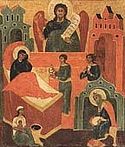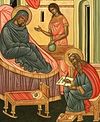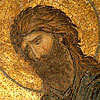

| Previous day | Next day |
| Old Style
May 25
|
Monday |
New Style
June 7
|
| 6th Week after Pascha. Tone 5. | No fast.
|
![]() Third Finding of the Precious Head of St. John the Baptist (ca. 850).
Third Finding of the Precious Head of St. John the Baptist (ca. 850).
Hieromartyr Therapontus, bishop of Cyprus (4th c.). St. Innocent (Borisov), archbishop of Kherson (1857). St. Thaddeus, archimandrite, of Svatogorsk Monastery (1758).
New Martyr Tavrion (Tolokontsev), monk, of Veliki Ustiug (1939).
“Lesna” Icon of the Most Holy Theotokos (1683).
St. Aldhelm, bishop of Sherborne (709). St. Bede the Venerable, hieromonk and chronicler, of Wearmouth and Jarrow (735). St. Gennadius, bishop of Astorga (ca. 936). Commemoration of the reunion of three million Uniates with the Orthodox Church at Vilnius in 1831. Martyrs of Adjara who suffered under the Turkish Yoke (18th c.). 1,290 New Martyrs of Piva (Montenegro), killed by the Nazis (1943). Synaxis of the New Martyrs of Chelm and Podlasie (Poland).
Repose of Recluse George of Zadonsk (1836).
Thoughts for Each Day of the Year
According to the Daily Church Readings from the Word of God
By St. Theophan the Recluse

Monday. [Acts 17:1–15; John 11:47–57]
What do we? for this man doeth many miracles (John 11:47). Jewish erudition found the Saviour to be guilty. And in our days, German erudition[1] finds what is supernatural to be out of place in the Gospels of Christ: everything is good, only this [the miraculous] just won’t work. These two ways of thinking meet in the final analysis. Jewish erudition decided: it is expedient that one man should die (John 11:50), and that the rest might not perish, while German erudition states: we will eliminate the supernatural to preserve all the other Gospel truths. And what came of this? The Jews destroyed their people, while the Germans lost all Christian truths, and now are left with almost nothing. The Lord is the cornerstone of the house of salvation; similarly faith in the supernatural is the cornerstone of the entire building of God-inspired truth. The Saviour Himself, in His Person, is the crown of the supernatural, and its inexhaustible Source is in the Church. He who touches this point is touching the apple of God’s eye.
[1] By “German erudition” St. Theophan is most likely referring to the Protestant German philosophers of his time.
Articles
 Nativity of the Holy Glorious Prophet, Forerunner and Baptist, John |
 Hieromartyr Therapon the Bishop of CyprusThe Hieromartyr Therapon, Bishop of Cyprus, lived a life of asceticism in a monastery, and afterwards he served as a bishop on the island of Cyprus. |
 Venerable Bede, the Church HistorianSaint Bede was a church historian who recorded the history of Christianity in England up to his own time. |













